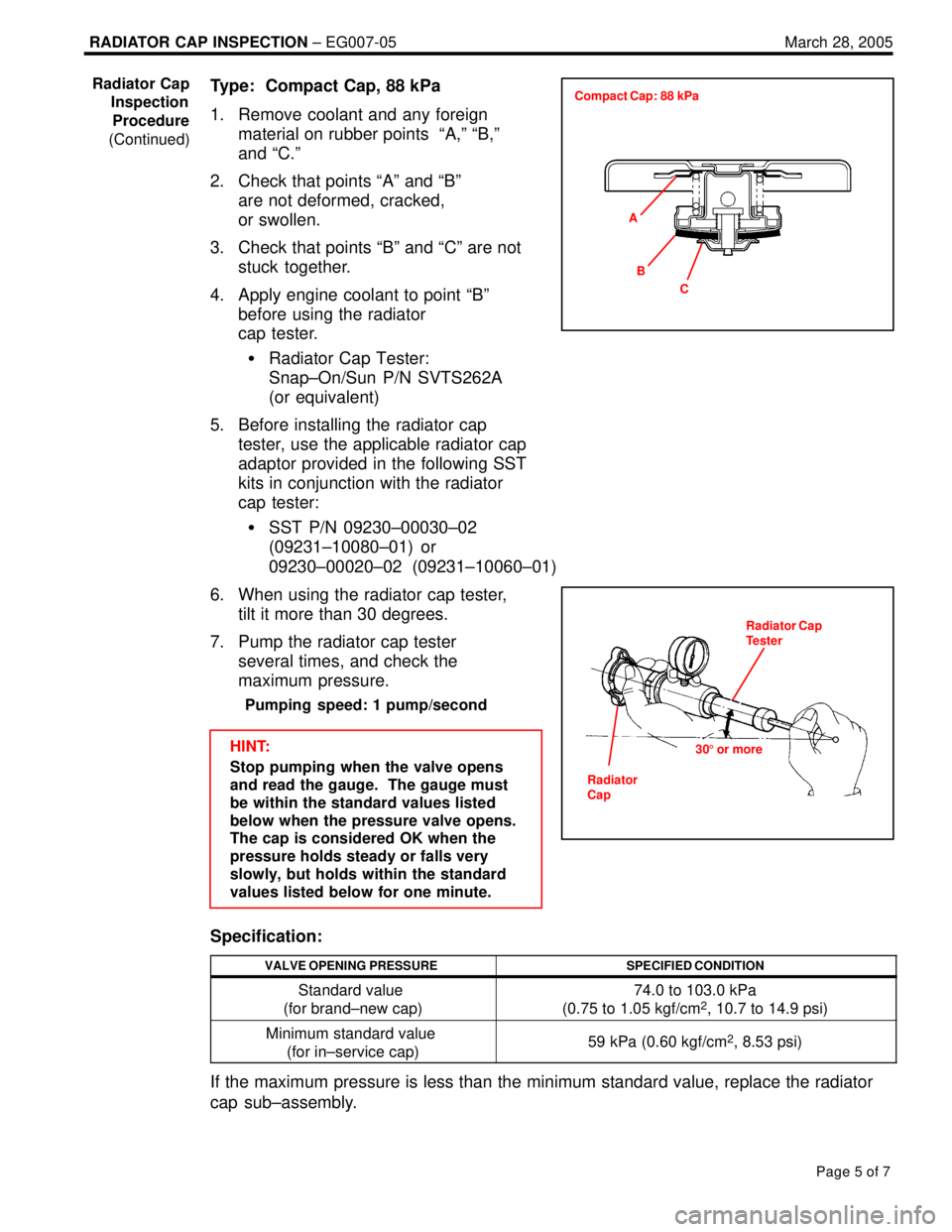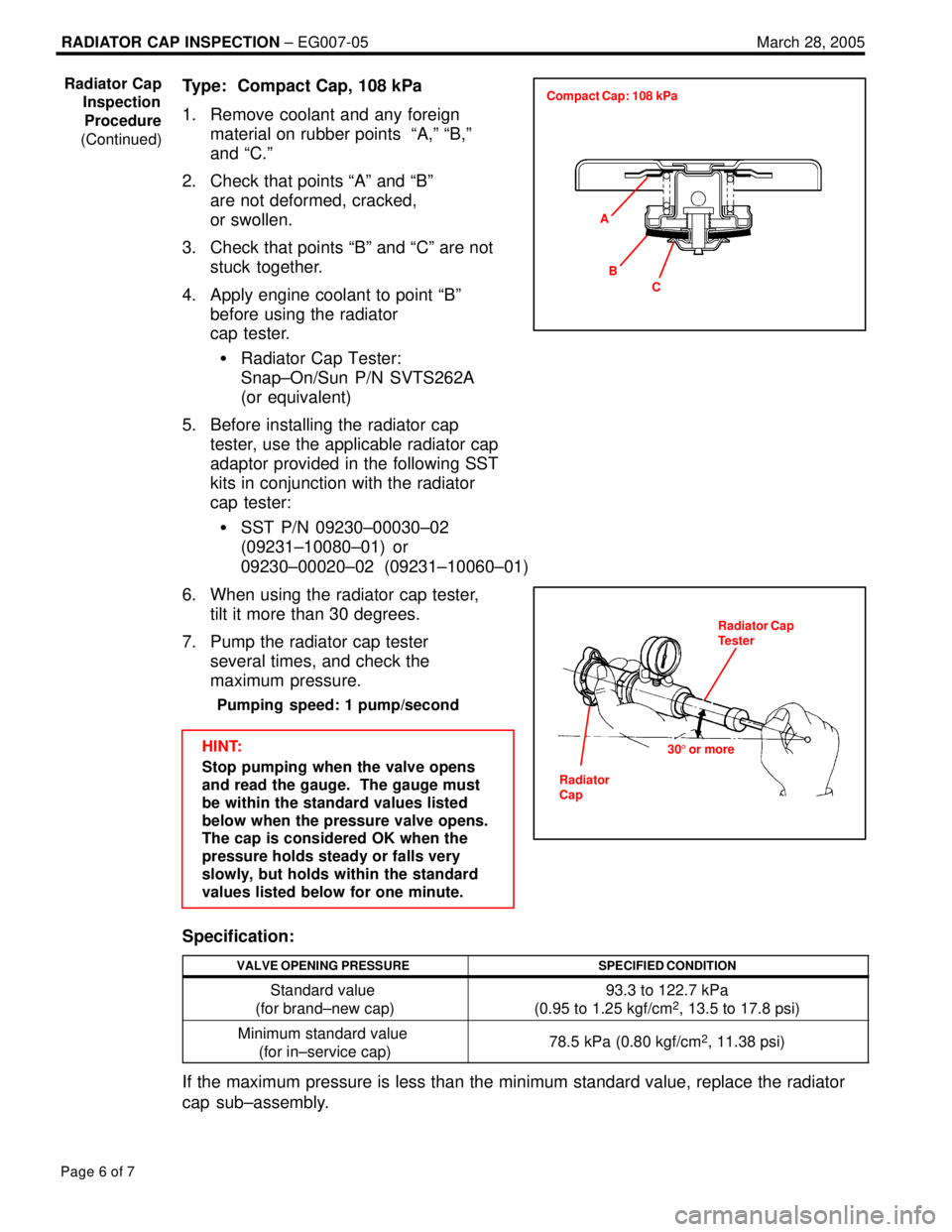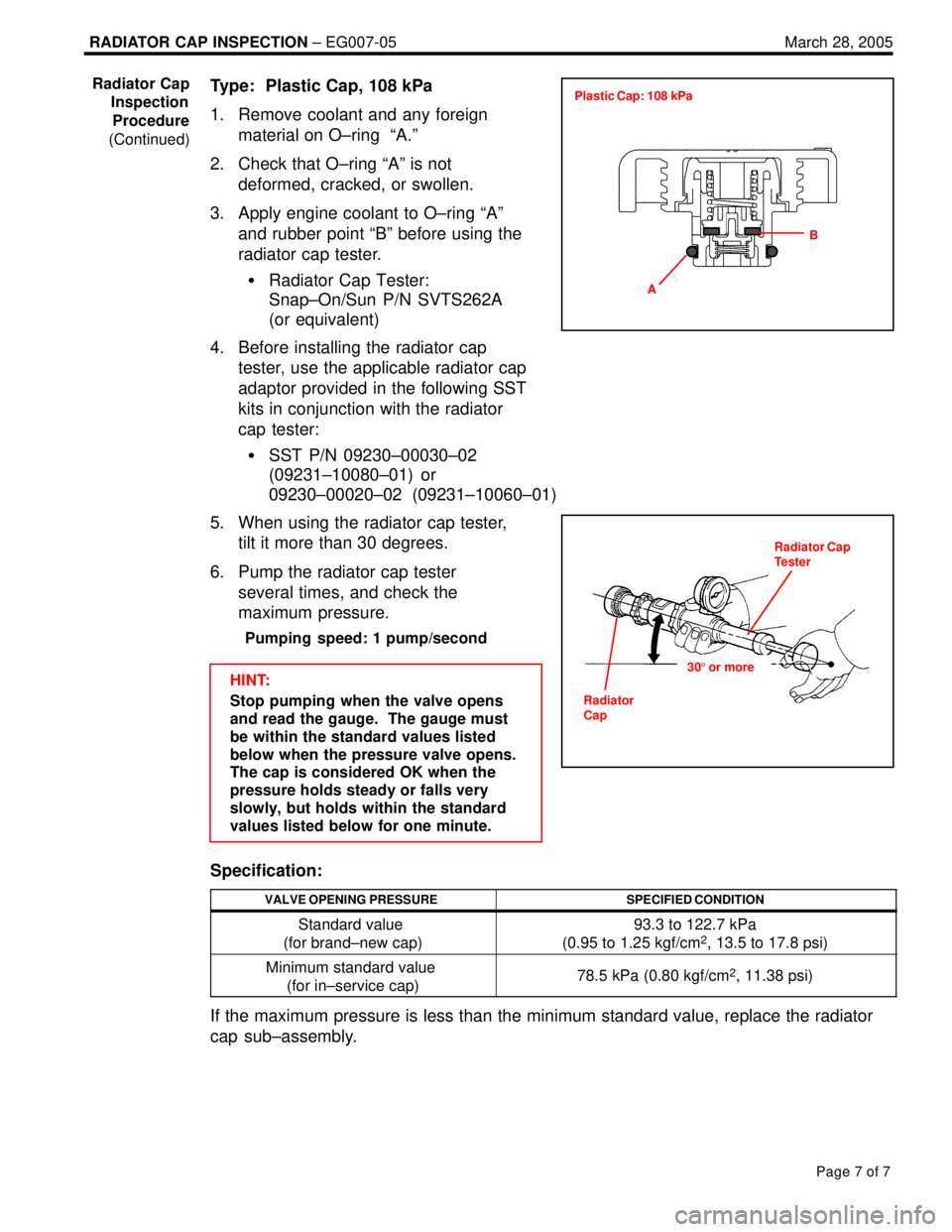Page 870 of 969

RADIATOR CAP INSPECTION ± EG007-05 March 28, 2005
Page 5 of 7
Type: Compact Cap, 88 kPa
1. Remove coolant and any foreign
material on rubber points ªA,º ªB,º
and ªC.º
2. Check that points ªAº and ªBº
are not deformed, cracked,
or swollen.
3. Check that points ªBº and ªCº are not
stuck together.
4. Apply engine coolant to point ªBº
before using the radiator
cap tester.
�Radiator Cap Tester:
Snap±On/Sun P/N SVTS262A
(or equivalent)
5. Before installing the radiator cap
tester, use the applicable radiator cap
adaptor provided in the following SST
kits in conjunction with the radiator
cap tester:
�SST P/N 09230±00030±02
(09231±10080±01) or
09230±00020±02 (09231±10060±01)
6. When using the radiator cap tester,
tilt it more than 30 degrees.
7. Pump the radiator cap tester
several times, and check the
maximum pressure.
Pumping speed: 1 pump/second
HINT:
Stop pumping when the valve opens
and read the gauge. The gauge must
be within the standard values listed
below when the pressure valve opens.
The cap is considered OK when the
pressure holds steady or falls very
slowly, but holds within the standard
values listed below for one minute.
Specification:
VALVE OPENING PRESSURESPECIFIED CONDITION
Standard value
(for brand±new cap)74.0 to 103.0 kPa
(0.75 to 1.05 kgf/cm2, 10.7 to 14.9 psi)
Minimum standard value
(for in±service cap)59 kPa (0.60 kgf/cm2, 8.53 psi)
If the maximum pressure is less than the minimum standard value, replace the radiator
cap sub±assembly.
Radiator Cap
Inspection
Procedure
(Continued)
A
C B Compact Cap: 88 kPa
Radiator Cap
Tester
305 or more
Radiator
Cap
Page 871 of 969

RADIATOR CAP INSPECTION ± EG007-05 March 28, 2005
Page 6 of 7
Type: Compact Cap, 108 kPa
1. Remove coolant and any foreign
material on rubber points ªA,º ªB,º
and ªC.º
2. Check that points ªAº and ªBº
are not deformed, cracked,
or swollen.
3. Check that points ªBº and ªCº are not
stuck together.
4. Apply engine coolant to point ªBº
before using the radiator
cap tester.
�Radiator Cap Tester:
Snap±On/Sun P/N SVTS262A
(or equivalent)
5. Before installing the radiator cap
tester, use the applicable radiator cap
adaptor provided in the following SST
kits in conjunction with the radiator
cap tester:
�SST P/N 09230±00030±02
(09231±10080±01) or
09230±00020±02 (09231±10060±01)
6. When using the radiator cap tester,
tilt it more than 30 degrees.
7. Pump the radiator cap tester
several times, and check the
maximum pressure.
Pumping speed: 1 pump/second
HINT:
Stop pumping when the valve opens
and read the gauge. The gauge must
be within the standard values listed
below when the pressure valve opens.
The cap is considered OK when the
pressure holds steady or falls very
slowly, but holds within the standard
values listed below for one minute.
Specification:
VALVE OPENING PRESSURESPECIFIED CONDITION
Standard value
(for brand±new cap)93.3 to 122.7 kPa
(0.95 to 1.25 kgf/cm2, 13.5 to 17.8 psi)
Minimum standard value
(for in±service cap)78.5 kPa (0.80 kgf/cm2, 11.38 psi)
If the maximum pressure is less than the minimum standard value, replace the radiator
cap sub±assembly.
Radiator Cap
Inspection
Procedure
(Continued)
A
C B Compact Cap: 108 kPa
Radiator Cap
Tester
305 or more
Radiator
Cap
Page 872 of 969

RADIATOR CAP INSPECTION ± EG007-05 March 28, 2005
Page 7 of 7
Type: Plastic Cap, 108 kPa
1. Remove coolant and any foreign
material on O±ring ªA.º
2. Check that O±ring ªAº is not
deformed, cracked, or swollen.
3. Apply engine coolant to O±ring ªAº
and rubber point ªBº before using the
radiator cap tester.
�Radiator Cap Tester:
Snap±On/Sun P/N SVTS262A
(or equivalent)
4. Before installing the radiator cap
tester, use the applicable radiator cap
adaptor provided in the following SST
kits in conjunction with the radiator
cap tester:
�SST P/N 09230±00030±02
(09231±10080±01) or
09230±00020±02 (09231±10060±01)
5. When using the radiator cap tester,
tilt it more than 30 degrees.
6. Pump the radiator cap tester
several times, and check the
maximum pressure.
Pumping speed: 1 pump/second
HINT:
Stop pumping when the valve opens
and read the gauge. The gauge must
be within the standard values listed
below when the pressure valve opens.
The cap is considered OK when the
pressure holds steady or falls very
slowly, but holds within the standard
values listed below for one minute.
Specification:
VALVE OPENING PRESSURESPECIFIED CONDITION
Standard value
(for brand±new cap)93.3 to 122.7 kPa
(0.95 to 1.25 kgf/cm2, 13.5 to 17.8 psi)
Minimum standard value
(for in±service cap)78.5 kPa (0.80 kgf/cm2, 11.38 psi)
If the maximum pressure is less than the minimum standard value, replace the radiator
cap sub±assembly.
Radiator Cap
Inspection
Procedure
(Continued)
A
B Plastic Cap: 108 kPa
Radiator Cap
Tester
305 or more
Radiator
Cap